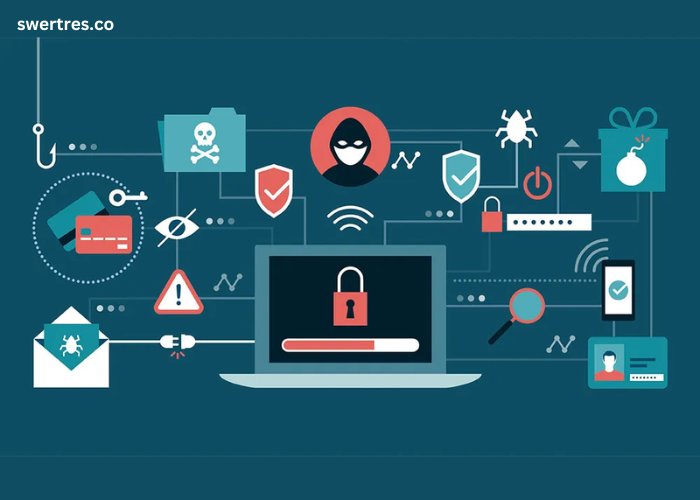In today’s digital world, where much of our lives are lived online, ensuring that we are practicing good cybersecurity is crucial. Cyberattacks and data breaches are becoming more sophisticated and prevalent, putting personal, professional, and financial information at risk. Whether you’re checking your email, shopping online, or using social media, there are several important steps you can take to protect yourself. Here are some essential cybersecurity tips to ensure safe online activity.
1. Use Strong, Unique Passwords
One of the simplest yet most effective ways to secure your online accounts is by using strong, unique passwords for each service. A strong password typically includes:
- A mix of uppercase and lowercase letters
- Numbers and special characters
- At least 12 characters long
Avoid using easily guessed information, such as birthdays or names. To make it easier to manage passwords, consider using a password manager, which securely stores and generates complex passwords for each account.
2. Enable Two-Factor Authentication (2FA)
Two-factor authentication (2FA) adds an extra layer of security to your accounts. With 2FA, you’ll need to provide two forms of identification before accessing your account: something you know (your password) and something you have (such as a code sent to your phone or email).
Most major websites and apps, including social media platforms, banking apps, and email services, support 2FA. Enabling this feature significantly reduces the risk of unauthorized access, even if someone has your password.
3. Be Cautious with Phishing Attempts
Phishing is one of the most common types of cyberattack, where attackers impersonate legitimate institutions (such as banks or online stores) to trick you into sharing personal information or downloading malicious software. Common phishing tactics include:
- Fake emails or text messages that look like they’re from trusted sources
- Suspicious links or attachments that prompt you to enter sensitive information
- Requests for personal details, such as your Social Security number or banking credentials
Always verify the sender’s email address, avoid clicking on suspicious links, and double-check URLs before entering any sensitive information.
4. Update Software Regularly
Outdated software can contain security vulnerabilities that hackers exploit. Keeping your operating system, apps, and antivirus software up to date ensures you have the latest security patches and fixes. Enable automatic updates whenever possible to stay protected from known threats.
In addition, updating your browser is essential, as it prevents attackers from exploiting flaws that can lead to malware or data theft.
5. Use Secure Networks
Public Wi-Fi networks (such as those in coffee shops or airports) are not secure and can be easy targets for hackers looking to intercept your data. When accessing sensitive information or making financial transactions online, use a secure, private network.
If you must use public Wi-Fi, consider using a Virtual Private Network (VPN) to encrypt your internet connection, which makes it more difficult for cybercriminals to track your online activity.
6. Be Mindful of What You Share Online
Oversharing personal information on social media or websites can make you a target for cyberattacks. Avoid sharing sensitive details like your full address, phone number, or financial information online. Review privacy settings on social platforms to limit who can see your posts and personal information.
Cybercriminals often use social media to gather information for social engineering attacks, where they manipulate victims into divulging sensitive information.
7. Install and Use Antivirus Software
Antivirus software plays a crucial role in protecting your devices from malware, viruses, and other malicious software. Regularly scan your computer, smartphone, and other devices for potential threats. Make sure your antivirus software is always up to date and configured to perform automatic scans.
8. Backup Important Data
Data loss can happen for many reasons, including cyberattacks like ransomware, system crashes, or accidental deletion. Regularly backing up important files, such as documents, photos, and videos, ensures that your data is safe and recoverable. Consider using a combination of cloud storage and external hard drives to store your backups.
9. Educate Yourself About Common Cybersecurity Threats
Cybersecurity is constantly evolving, and being aware of the latest threats and trends can help you stay one step ahead of cybercriminals. Subscribe to cybersecurity blogs, attend webinars, or take online courses to stay informed about emerging threats like ransomware, spyware, and more.
By educating yourself about common threats, you can recognize suspicious activities and avoid falling victim to cyberattacks.
10. Practice Safe Online Shopping
When making online purchases, ensure that the website is legitimate and uses encryption to protect your financial information. Look for “https://” in the URL (the “s” stands for secure) and a padlock symbol in the browser’s address bar.
Never save your payment details on unfamiliar websites, and only purchase from trusted retailers. Before submitting any payment, review the security policies and terms of service to ensure they’re reputable.
11. Secure Your Devices with a Password or Biometric Authentication
Securing your devices—whether it’s a smartphone, tablet, or computer—with a password or biometric authentication (such as fingerprint or facial recognition) helps protect your personal data from unauthorized access. This is especially important if your device is lost or stolen.
12. Monitor Your Accounts and Credit Reports
Regularly check your bank and credit card statements for any unusual activity. If you spot anything suspicious, report it immediately. Additionally, keep an eye on your credit report to catch potential identity theft early on. Several services offer free credit monitoring, which can alert you to any changes in your credit file.
Conclusion
With cyberattacks becoming more frequent and sophisticated, safeguarding your online activity has never been more important. By adopting strong passwords, enabling two-factor authentication, staying cautious of phishing attempts, and practicing safe browsing habits, you can greatly reduce the risk of falling victim to cybercrime. Taking a proactive approach to cybersecurity ensures your online activities remain secure, helping to protect your personal information, finances, and overall digital wellbeing.

